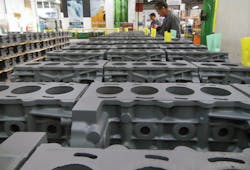Tupy Buys Teksid Iron Foundries from FCA
Fiat Chrysler Automobiles N.V. agreed to sell its Teksid SpA iron foundries to Brazil-based Tupy S.A. for an estimated $233 million (€210 million), subject to customary purchase-price adjustments at closing, which is expected in the second half of 2020. Fiat recently finalized its much-discussed merger with French automaker PSA Groupe.
Tupy indicated it will grant commercial bonuses and discounts to FCA for long-term supply of automotive parts, describing these as "typical of the industry".
"Together, Teksid and Tupy will continue to develop new technologies to support the continued success of our products,” state FCA global chief manufacturing officer Scott Garberding. “The proposed transaction represents another important step in the implementation of FCA’s business plan.”
Teksid is the metalcasting business established by Fiat SpA in 1917 (now FCA), with various additions through expansion, acquisition, and consolidation, including combination with casting plants owned by the Renault group. Teksid products are supplied to various FCA product lines and to other automakers and Tier 1 suppliers, including Cummins, Ford, and General Motors.
The Teksid aluminum foundries in Brazil and Italy are not included in Tupy's acquisition.
The sale includes foundries in Brazil, Mexico, Poland, and Portugal, as well as a joint-venture interest in an automotive foundry China, producing gray, ductile, and CGI automotive castings. The range of products includes cylinder blocks and heads, crankshafts and cam shafts, suspension arms, bedplates, steering knuckles, differential cases, and exhaust manifolds.
The combined businesses represent over €1.5 billion in 2018 revenues, with over 20,000 employees.
Tupy presently operates iron foundries in Brazil and Mexico, mainly for automotive markets but also supplying parts for freight transport, construction, agriculture and other industrial applications. In its announcement, Tupy expressed confidence that the purchase "will provide substantial opportunities for sharing best practices in key processes, enabling Tupy to expand its business and more successfully manage future industry challenges." Together, the combined companies would have had more than €1.5 billion in revenues in 2018 and employed over 20,000 employees.
According to Tupy CEO Fernando de Rizzo: "The proposed combination of assets, people, and knowledge will enable a significant increase in our ability to develop new technologies and deliver superior value-added products and services to our customers worldwide."
